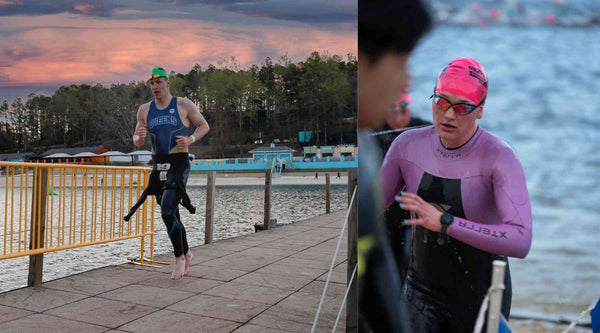Queens University Triathlon: Sonni Dyer Coaching at The Forefront
With six NCAA division 2 titles to their name and an undefeated record in the mixed relay since 2018, the success of the Queens University triathlon program has produced four Olympians, thirteen professionals, and is attracting athletes from all over the globe. Recently, the team added another win at USAT Division II Collegiate National Championships to their collection, solidifying their position as one of the foremost U23 development triathlon teams on the planet.
With 17 nationalities represented on the team of 40 this season, head coach Sonni Dyer has made Charlotte, North Carolina a hotspot for triathlon talent incubation. Dyer says it’s not just the success of the program that is attracting athletes, it’s the rare combination of performance sport and quality education. “It’s a very high-quality education at Queens—it’s a small private institution—and a competitive environment,” Dyer explains. “For a lot of internationals, you either go to school or you stay in sport, you don’t do both. The varsity collegiate model has taken root in soccer, swimming, and track and field, and has now transitioned into triathlon.”
An NCAA Emerging Sport
The varsity collegiate model that is so successful in the USA is well known for producing world class athletes, specifically through the NCAA (National Collegiate Athletic Association) system that provides both funding and sporting opportunity. “It's pretty common in an [NCAA sport] Olympic final that most of those people, even though they might be from different nations, most of them competed in the NCAA somewhere in the United States,” Dyer explains. “That’s what we are beginning to see in triathlon, and we just happen to be on the forefront of it.” 
In 2015, the NCAA recognized women’s triathlon as an emerging sport, prompted by Title IX and subsequently leading to funding for institutions across the USA to create and develop women’s triathlon programs. Queens University was one of those institutions and Dyer was specifically hired to start their women’s triathlon team. As the third grant-funded program in the country, Dyer was able to offer prospective students scholarships and sporting opportunity. “In the NBA they have the G-league, in baseball you have the minor leagues, NCAA football is the developmental pipeline for the NFL, that’s essentially what we are doing here.”
A New Model: Team-First Mentality
Applying the NCAA model to triathlon, Dyer framed his program differently than more traditional triathlon development teams. While he says the training is not all that different, Dyer is adamant about their “team first mentality.” Most athletes that come to Queens are used to being in an individual sport, triathlon or otherwise, but that’s not the way the Royals operate.
“Even if you’re the fastest, we don’t chase down our teammates. We have to operate as a unit,” “We have a team-first mentality.”
One small yet significant change Dyer instituted was leaving behind the traditional separation between long distance and short course specialists. “We’ve re-identified as swim, bike, run,” Dyer says. “With Super League, Island House, Clash races, and all the new more marketable formats, it’s blurred the line. You're not long or short, but a triathlete.”
Dyer also brings the team together in training. While the NCAA program is focused on fostering female talent, Dyer also provides opportunity for male athletes through a collegiate club and trains them together. Training both the men and the women together, NCAA and club, gives them an advantage—their undefeated title in the mixed team relay for the past five years stands as proof. Not only does it especially push the female athletes, but with the mixed team relay making its Olympic debut in Beijing, Dyer sees the sport of triathlon progressing more toward the new formats and he intends to have his athletes ready.
“We don’t succeed just because of funding,” Dyer says, an assumption many people make. Nor is it from recruiting already-developed talent, he adds. “We really succeed because of togetherness and getting everybody on the same page and pushing together. It’s not about me; it’s about what they do to be better together. Talent wins races, teams win titles.”
Training for the Future
Still, working with athletes who have “one foot on the adolescent side of the fence and one foot not he adult side” means there is an adjustment period to the way the Royals operate and an athlete’s personal development within that framework. “A lot of athletes come from a national team environment, and they are very focused on results,” Dyer says, noting freshman athletes need time to adjust to the team culture. “We never expect perfection; we show them the process of the daily grind. We take the long view,” Dyer says.
Day-to-day, that means he often reduces an athlete’s volume, races athletes into shape, includes short breaks throughout the year, and “pays attention to recovery in a dedicated way,” not only because his athletes are also full-time students, but because his program aims to build athletes for success beyond their collegiate experience.
While he is incredibly proud of the longstanding team success, he is also proud of the success beyond the team. He lists the athletes who have gone on to race professionally, compete at the Olympics, and those who have transitioned successfully into other careers thanks to their degree and their experience on the team.
Shaping the Future
The future of triathlon as an NCAA sport is still yet to be confirmed but Dyer plans on expanding the Queens program next year to offer opportunities to an additional six students. “Our model works,” Dyer says, referring to the team mentality and structure. “Being able to say ‘yes and’ to NCAA and collegiate club, we’re trying to elevate the whole tide so that all ships can rise. I’d like to see more club teams adopt NCAA women’s triathlon and I’d like to see more NCAA teams incorporate men on their collegiate club side. It’s a model that works, it’s a model that raises the game.”



